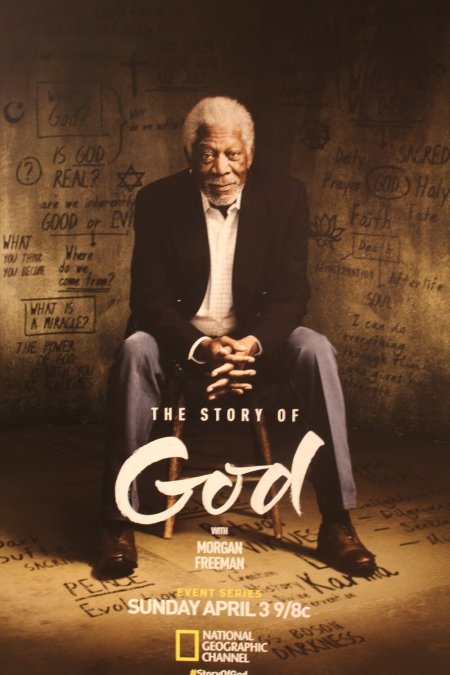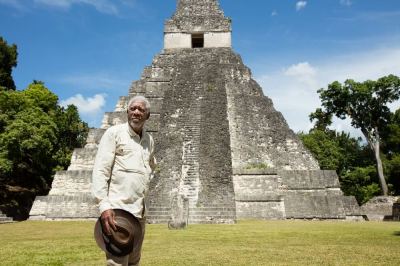Morgan Freeman's 'The Story of God' Series Is Like Personal Journey of Faith

"The Story of God" with Morgan Freeman, premiering Sunday night, serves as the intriguing exploration of one influential man's journey to faith. In the National Geographic Channel/Revelation Entertainment's series, Freeman sets out to travel 20 cities in seven different countries on an intimate journey to find answers to the big mysteries of faith.
Although viewers are not sure initially what to expect when they see Freeman on the cover surrounded by various religious symbols, the actor was able to set the tone by sharing about his childhood and the losses he experienced.
"Everybody grieves but some people have a certainty that helps them cope with grief. They are certain they will see their loved ones again in Heaven. For some of us, it's not quite that simple. In fact, it's the greatest question we ask ourselves: What happens when we die?" Freeman asks.
He reveals that he lived through the deaths of both his grandmother and brother before the age of 18, and admitted that for him, the hope that there is life beyond death doesn't come easily.
In episode one, "Beyond Death," Freeman explores the afterlife: how beliefs in the afterlife developed, how our reaction to the afterlife changed the way we live, and the rapid advances science is making for a "digital resurrection."
Kicking things off in a cathedral, the series features the miraculous story of how research diver David Bennett survived a near-death experience out at sea. The professional diver was under water for about 18 minutes after getting hurt and experienced a glimpse of the afterlife.
Bennett described his experience as an encounter with millions of fragments of light that he felt very connected to. The light (he calls God) spoke and said, "This is not your time," assuring him that he has a greater purpose. So after brushing up against a rock that brought the air back into his lungs, he came back to life.
Bennett stated he believes in the afterlife now and said that he believes in all different belief systems.

On the journey, viewers are then taken to the tombs of ancient Egyptians. Freeman heads to Egypt to discover the birth of the afterlife.
He finds himself inside of an old pyramid surrounded by a wall of magical spells,which his tour guide explained was the "key survival" for the ancient Egyptians 5000 years ago. It was believed that Pharaoh would pass through the afterlife and fight demons to help all of civilization stay afloat.
From there the 78-year-old actor then journeyed to Mexico to explore the famous "Dia De Los Muertos" tradition, with those who practice it believing that the dead are awakened and are part of the community to share in the celebrations with their loves ones on that day.
Freeman commented, however, that the Aztec's tradition of performing mass sacrifices and pulling people's hearts out to keep the sun shining and crops growing, is very "unChristian."
Next he visited the presumed site of Jesus' burial in Jerusalem in hopes of exploring the Christian belief of eternal life. "The Evan Almighty" actor said, "For Christians a graveyard is a symbol of hope for life beyond death. A hope named Jesus."
Freeman, who has played the role of God multiple times on the big screen, was warm and comfortable telling the story of the crucifixion of Jesus.
While in Jerusalem he visited the Church of the Holy Sepulchre where it is said that the crucifixion and burial of Christ took place. "You can really feel the energy here," Freeman said while in Jesus' supposed tomb.
"Jesus death was the ultimate sacrifice" the archaeology guide explained after talking about his resurrection.
Following that, the Academy Award winner found himself on the banks of the Ganges River in India, where Hindus bring their deceased.
Freeman met with a monk and visited the famous crematorium where he was taught that people celebrated death because of their belief in reincarnation. The Hollywood star learned that ultimately Indians are not looking to reincarnate but instead hope to receive eternal pure energy, called Moksha.
The series then takes an interesting turn when Freeman heads to a cutting-edge scientific laboratory seeking to help humans live forever via digital immortality.
A scientist in New York named Sam explained to Freeman, who has now turned into a full-blown student soaking up every word, that there is a universal experience of death in all people he has studied that died and lived again to tell of it – they all describe the experience as pure peace and joy.
Freeman, who seemed very intrigued by the human soul, asked for scientific support for the soul living beyond death. He was told in science the term for soul is called consciences and it does in fact live on.
Following that visit, Freeman met a robot named Bina48, which is a thinking machine crafted after the maker's spouse. The robot stores thoughts, beliefs and emotions. He cautiously spoke to the robot and then met the real Bina and her partner to learn more about what he called his "uncanny experience."
"The Story of God" ended back where it began in Egypt but this time at the tomb of Ramses. It was said that each human pharaoh of the later New King period was believed to be a reincarnation of their most supreme being, Horus.
It is believed that every time the Egyptian name of Ramses is spoken, he is reborned. Freeman eerily kept repeating his name as if he had found what he believed in. The actor ended the program by saying something that Illuminati conspiracist would probably have a field day with, "His (Ramses) spirit is still with us, still moving among the living."
For more information on "The Story of God" with Freeman, visit www.natgeotv.com. It premieres on the National Geographic Channel on Sunday, April 3 at 9 p.m. ET.
Watch an exclusive sneak peek of episode two, "Apocalypse," below.





















